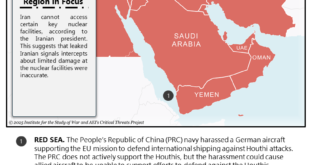The Jordanian government bypassed parliament and approved a controversial agreement signed between Jordan and the United States that regulates the status of US forces present in the kingdom, which raised much controversy.
On Jan. 31, Jordan and the United States signed a defense cooperation agreement. It was approved by the Jordanian government Feb. 17, and a royal decree approving the agreement was published March 16 in the Official Gazette, effective immediately, without being presented before the parliament, or National Assembly, which is made up of the House of Representatives and the Senate.
Jordanians were shocked that such an agreement had been approved only a few days after the US State Department and the US Embassy in Jordan issued a level 3 alert March 10, warning US citizens against traveling to several locations in the kingdom due to the COVID-19 pandemic and the dangers of what it called “terrorism and crime.”
The US-Jordanian agreement, published on the Jordanian news site Ammon, is made up of 19 articles that regulate the status of US forces in Jordan and how to deal with US members on Jordanian territory. The main terms of the agreement state that US forces may carry weapons on Jordanian territory while conducting their missions and may transport and stock equipment and supplies. The agreement also allows US personnel, their aircraft and ships to “freely enter and exit Jordanian territory without applying for a visa.”
The agreement sparked criticism from some members of the Jordanian parliament, opposition political parties such as the Islamic Action Front and political and legal experts.
Many expressed concerns that the agreement was reminiscent of the colonial past and violated Jordanian sovereignty. Others said they believe the agreement violates the Jordanian Constitution and laws, as it was approved by the government without going through parliament, as stated by law.
Diplomatic relations between Jordan and the United States were first established on Feb. 18, 1949, when Wells Stabler presented his credentials as charge d’affaires in Amman. Since then, Jordan and the United States have enjoyed strong relations based on common goals and mutual respect. The relationship has endured the complexities and volatility of the Middle East and has demonstrated that the two countries can rely on each other as allies and partners. Since 1951, the United States has become the largest single provider of bilateral aid to Jordan, providing over the past seven decades more than $20 billion in aid. Washington also has designated Jordan as a major non-NATO ally and the two countries have signed a free trade agreement. Jordan is also a member of the US-led global military coalition arrayed against al-Qaeda, the Islamic State and their regional and global affiliates.
Omar al-Raddad, a strategic security expert and CEO and founder of Middle Path for Strategic Consulting in Amman, told Al-Monitor, “The agreement carries a message showing the importance of Jordan as geopolitics are currently playing in its favor. This message is addressed to all regional powers in the region, on top of which is Israel, whose peace frameworks with Amman seem to be colder than ever. However, the timing of the agreement is particularly significant since it reveals important aspects of the upcoming US military strategy in the region, which includes new directions to free the US up for confrontation and open conflict with Russia and China, because the agreement will facilitate the movement of US forces in the region, and make this movement faster and less costly.”
Raddad added, “It seems that the possibility of a partial US withdrawal from the region is very likely and the agreement may explain this, especially since the US military bases in the region are under pressure from US-allied governments, as is the case with their bases in Turkey, where some NATO countries have left the famous Incirlik Air Base.”
Saleh al-Armouti, a member of parliament for the Islamic Reform bloc and a former head of the Jordanian Bar Association, criticized the agreement during the parliament session March 21, saying, “The agreement represents new colonialism and control over the state’s facilities as a whole, as well as an aggression against the state, its existence, sovereignty; it is blatant interference.” He called on the ministers who signed the agreement to submit their resignations, and for parliament to hold a session to discuss it.
Jordanian Bar Association President Mazen Irsheidat told the Jo24 news website March 22 that the agreement contained “a direct and explicit violation of the Jordanian constitution and laws since it was not approved by parliament.” He added that the agreement “gives immunity to US soldiers from Jordanian courts and allows US forces to use bases and lands in Jordan.”
The secretary-general of the Islamic Action Front Party, Murad al-Adayleh, attacked the agreement in a March 22 statement, describing it as being “closer to the mandate.”
Bashar Jarrar, a part-time speaker and trainer with the US State Department’s Public Diplomacy Program in Washington, told Al-Monitor, “These skeptics, especially some MPs who attacked the agreement, have no credibility. There is absolutely no prejudice to the sovereignty of Jordan. The agreement preserves sovereignty and is limited to facilitating the work of the military and their contracting parties in pre-defined and publicly announced locations, all of which are military bases and facilities. There is also nothing new, in principle in the 2021 agreement, which is a logical and natural continuation of the 1996 Status of Forces Agreement.”
Jordan and the US signed the Status of Forces Agreement on April 4, 1996; it regulates “the status of US military personnel and civilian employees of the Department of Defense who may be present in Jordan in connection with their official duties.”
Jarrar added, “The fact that both the Jordanian and US foreign ministries made official statements and published facts, not opinions or impressions, about what the two countries’ partnership has achieved, is a sufficient response to the skeptics who only want to promote a propaganda that opposes any US action and government decision.”
Foreign Minister Ayman Safadi immediately responded to criticism during the March 21 parliament session and briefly summarized the Jordanian position on the agreement, saying, “It is a framework agreement, on which negotiations were held. The agreement does not contradict the second clause of Article 33 of the Constitution [on the decision of war and peace], nor does it authorize the US forces to carry out hostilities inside Jordan.”
He added, “All the articles of the agreement abide by national laws, international laws and the Vienna Agreement that defines relations between countries.” He stressed that the agreement does not authorize US forces to carry out combat operations inside the kingdom, saying everything is within the framework of training and that the sovereign decision remains with Jordan.
Victoria Silva Sanchez, a freelance researcher in Jordanian and Middle East affairs, told Al-Monitor, “The agreement aims to restore the significance of Jordan as an important ally for the US, which had diminished during the Donald Trump administration. However, the agreement is very problematic. The security and military cooperation between Jordan and the US is really strong and well-established, so there was no need to sign such an agreement. The Jordanian authorities recognize that it was not right to secretly negotiate this agreement and not allow the parliament to have a say in it.”
Sánchez added, “Of course, the Jordanians will not welcome it while they see US soldiers openly carrying their weapons, which they may consider humiliating to them. The agreement could become a source of conflict and a target for extremist groups. It can really lead to very negative consequences rather than improving any kind of security.”
It could be said that the agreement points to one of the flaws in the democratic system for monitoring and accountability in Jordan in general, namely that there are no committees in parliament that specialize in national security and intelligence issues similar to the US committee known as the US House Permanent Select Committee on Intelligence, whose task is to study such sensitive issues.
However, military and security expertise in the parliament is abundant. Some estimates indicate that 22 members of the House of Representatives are retired soldiers and security officers, or 16.9% of the body’s 130 legislators; 13 have legal and human rights backgrounds. As for the 65-member Senate, whose members are appointed by the king, 21 members have military and security backgrounds.
This means that even if the agreement was presented to the National Assembly in its current military-security formation, it would have encountered opposition that would prevent it from being signed. But this move would have helped give it more power and legitimacy in a democratic way that is more flexible and more beneficial to both parties now, and in the future.
 Eurasia Press & News
Eurasia Press & News


